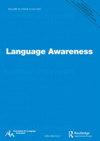Linguistic purism and loanword adaptation techniques: the case of Polish
IF 2.2
2区 文学
0 LANGUAGE & LINGUISTICS
引用次数: 0
Abstract
Abstract This article reports on a study whose aim was to analyze the relation between the level of declarative purism and the preference for a particular loanword adaptation technique. Evidence from many languages shows that language purists accept foreign words more readily if they are in a native disguise; as a consequence, they choose adaptation techniques which mask the origin of foreign words. An online survey (N = 213) making use of invented loanwords showed that educated Poles who declare a high level of purism are, in comparison with those who do not care about the purity of their language, less tolerant of unadapted loanwords and more apt to accept their native synonyms, newly coined for that purpose. In addition, assuming that loanword adaptation techniques are ordered with respect to how well they mask the foreign origin of a word, respondents who prefer a certain adaptation technique opt for techniques which are close in the assumed order but dislike distant techniques. The survey also showed that the aversion to loanwords increases with the respondents’ age and decreases with their English language competence.语言纯粹主义与外来词改编技巧——以波兰语为例
摘要本文报道了一项研究,旨在分析陈述性纯粹主义的水平与对特定外来词改编技术的偏好之间的关系。来自许多语言的证据表明,如果外来词是母语伪装的,语言纯粹主义者会更容易接受这些外来词;因此,他们选择了掩盖外来词来源的改编技术。在线调查(N = 213)使用发明的外来词表明,与那些不关心语言纯洁性的人相比,受过教育的波兰人宣称自己具有高度的纯粹主义,他们对未经改编的外来词的容忍度较低,更倾向于接受为该目的而新创造的本土同义词。此外,假设外来词改编技术是根据它们在多大程度上掩盖了一个词的外国来源而排列的,那么喜欢某一改编技术的受访者会选择在假设顺序上接近但不喜欢遥远的技术。调查还显示,受访者对外来词的厌恶程度随着年龄的增长而增加,而随着英语能力的提高而降低。
本文章由计算机程序翻译,如有差异,请以英文原文为准。
求助全文
约1分钟内获得全文
求助全文
来源期刊

Language Awareness
Multiple-
CiteScore
3.70
自引率
10.00%
发文量
18
期刊介绍:
Language Awareness encourages and disseminates work which explores the following: the role of explicit knowledge about language in the process of language learning; the role that such explicit knowledge about language plays in language teaching and how such knowledge can best be mediated by teachers; the role of explicit knowledge about language in language use: e.g. sensitivity to bias in language, manipulative aspects of language, literary use of language. It is also a goal of Language Awareness to encourage the establishment of bridges between the language sciences and other disciplines within or outside educational contexts.
 求助内容:
求助内容: 应助结果提醒方式:
应助结果提醒方式:


